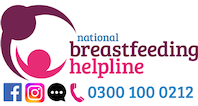How often will I need to feed my baby?
Feeding patterns are different for every baby, but you can expect to feed your baby at least 8-12 times every 24 hours in the first few weeks. Breastfed babies can sometimes feed very frequently, especially in the early days. Breastfeeding is more than just a way of feeding a baby, it is a relationship and a way of parenting. Babies may feed because they are hungry or thirsty, but also for comfort, to relieve pain, or to help them sleep. You cannot overfeed a breastfed baby, it is normal and healthy to feed your baby for all of these reasons.
When a baby is first born, they have a very small stomach and need to feed very frequently through the day and night as they quickly digest the small quantities of milk they consume. It is best to feed them responsively, whenever they seem like they might want to feed. Frequent feeding also stimulates your milk supply and sets you up to produce enough milk for your baby in the weeks and months to come.
It can sometimes feel like you do very little other than feed them at the beginning, but as your baby grows, their stomach will get bigger and they will be able to feed more efficiently, take larger feeds and go longer between feeds.
The length of a breastfeed varies a lot between babies and also throughout the day. It is normal for a breastfeed to last anywhere between 5 minutes and 40 minutes, or sometimes a little longer. Your baby will come off the breast by themselves when they have finished feeding.
Feeding during the night is just as important as during the day. Night feeds can help boost your milk supply as levels of the milk-making hormone prolactin are higher. Whilst some babies may begin sleeping longer at night after a few weeks or months, it is normal for them to start waking more frequently again, and for night-time feeds to continue through the first year and beyond.
If your baby is feeding all the time and you are worried, speak to a midwife, health visitor or a breastfeeding specialist. You may need some help with how you are bringing your baby to your breast (positioning and attachment). You can also contact the National Breastfeeding Helpline.

How easy is it to breastfeed?
Some mums find breastfeeding easy from the start, and for others, it can be challenging to begin with. Breastfeeding is a natural process, but it is also a skill, and you and your baby will need to learn together. It’s a bit like walking. Walking may be natural and instinctive, but toddlers still have to learn how to do it, still have to spend a few weeks practicing it before it becomes easy, and still need some help at the start. Working on how you hold your baby and how you bring them to your breast (positioning and attachment) and getting used to feeding responsively will help things go much more smoothly, and a breastfeeding supporter will be able to help you with this. Most mums find that after the first few weeks breastfeeding takes much less effort than it did at the beginning. Some mums find that breastfeeding is easier than formula feeding once they have got the hang of it, as they don’t need to worry about mixing feeds and sterilising bottles. If you are breastfeeding, you always have your baby’s milk with you and ready to feed, wherever you are.
If you are finding breastfeeding challenging, or you want to chat to someone who has done it before to help you prepare whilst you are pregnant, you can drop in to one of our support groups, or contact the National Breastfeeding Helpline.
Does Breastfeeding hurt?
Breastfeeding should not hurt. However, it is quite common for women to experience some discomfort when they start to breastfeed, although some mums have no pain at all. You may find that your nipples feel tender or sensitive for a few seconds at the start of a feed, but this should pass quickly.
Pain is usually a sign that the way you are holding your baby and bringing them at the breast (positioning and attachment) can be improved. Sometimes just a small adjustment can make a big difference, both to how comfortable you are and how much milk your baby gets. A breastfeeding supporter can help you adjust your positioning and attachment, allowing you to find a position that is comfortable for you. With support and a bit of practice, most mums find that they are able to breastfeed comfortably before long. You can read more about how to position and attach your baby here, and more about other possible causes of nipple and breast pain here.
If you are finding breastfeeding painful, its best to get help as soon as you can. You can drop in to one of our support groups or contact the National Breastfeeding Helpline.

External links – Breastfeeding toddlers and older children
Speak to a registered Breastfeeding Supporter
The National Breastfeeding Helpline is available
9:30 am to 9:30 pm, 365 days a year. Or talk to us by webchat when available.

